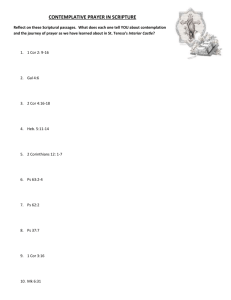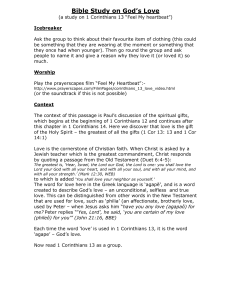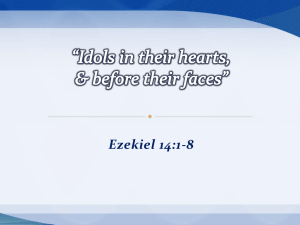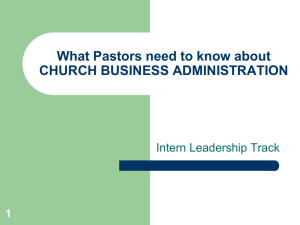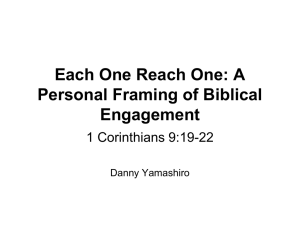o`doj
advertisement
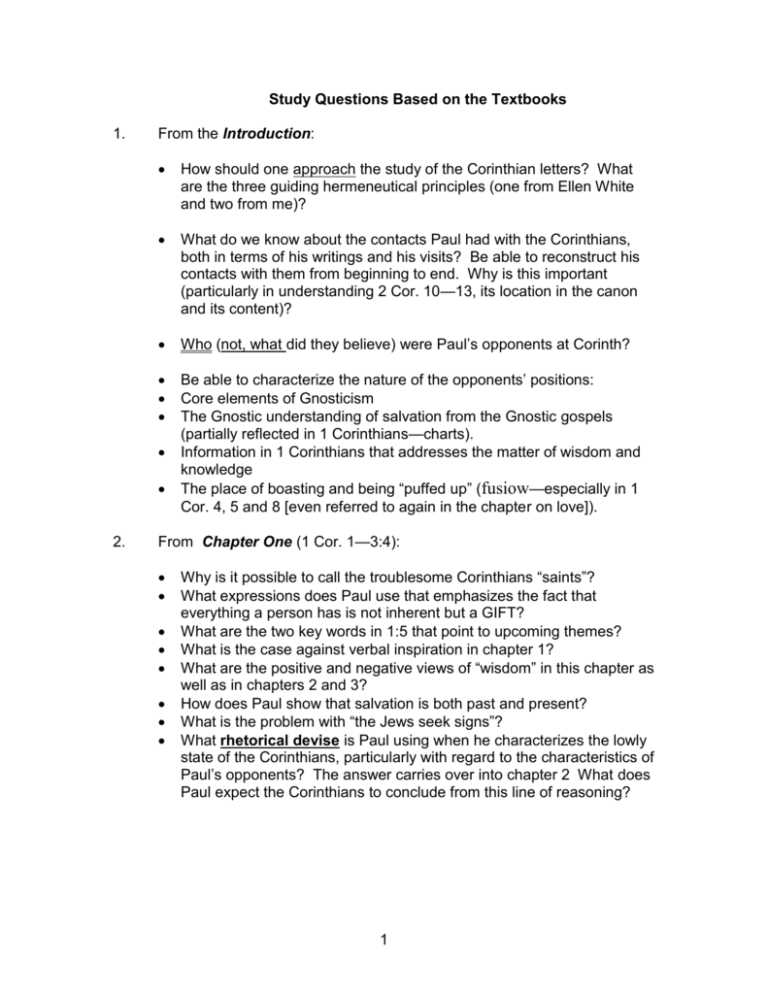
Study Questions Based on the Textbooks 1. From the Introduction: How should one approach the study of the Corinthian letters? What are the three guiding hermeneutical principles (one from Ellen White and two from me)? What do we know about the contacts Paul had with the Corinthians, both in terms of his writings and his visits? Be able to reconstruct his contacts with them from beginning to end. Why is this important (particularly in understanding 2 Cor. 10—13, its location in the canon and its content)? Who (not, what did they believe) were Paul’s opponents at Corinth? Be able to characterize the nature of the opponents’ positions: Core elements of Gnosticism The Gnostic understanding of salvation from the Gnostic gospels (partially reflected in 1 Corinthians—charts). Information in 1 Corinthians that addresses the matter of wisdom and knowledge The place of boasting and being “puffed up” (fusiow—especially in 1 Cor. 4, 5 and 8 [even referred to again in the chapter on love]). 2. From Chapter One (1 Cor. 1—3:4): Why is it possible to call the troublesome Corinthians “saints”? What expressions does Paul use that emphasizes the fact that everything a person has is not inherent but a GIFT? What are the two key words in 1:5 that point to upcoming themes? What is the case against verbal inspiration in chapter 1? What are the positive and negative views of “wisdom” in this chapter as well as in chapters 2 and 3? How does Paul show that salvation is both past and present? What is the problem with “the Jews seek signs”? What rhetorical devise is Paul using when he characterizes the lowly state of the Corinthians, particularly with regard to the characteristics of Paul’s opponents? The answer carries over into chapter 2 What does Paul expect the Corinthians to conclude from this line of reasoning? 1 3. From Chapter One 1 Cor. 3:5—4:21): “Christ became wisdom” (1:30). What is Paul saying here so far as 2:8 is concerned? What is the significance of the words: “rulers of this age”? Why is the discussion on what constitutes a “spiritual person” so important? What is the content of this discussion (carries over into the next chapter)? [See number 10 below] The significance of “psuchikos” in vs. 14…. Indicate the significance of Paul’s emphasis on the Cross in 1 Corinthians 1—3 so far as the definition of “wisdom” is concerned. Particularly, how does this theological theme ties together all of his comments vis-à-vis their aberrant behavior, and further, help us identify the gnostic aspects of the heresies. What does Paul seek to accomplish with his reference to the three builders? Discuss how the divisions in the Corinthian view differs with Paul’s view of the divisions. This includes Paul’s case that he and Apollos are on the same team. Expressions used to show unity between Paul and Apollos including their roles vis-à-vis God’s part in their ministry The use of terms for “servants”…(4:1) The importance of the term “build up” What is the case for the “Christ party” being the antagonists [textbook gives five reasons]? Significance of Paul’s use of pneumatikoi [spiritual persons], beginning with the first discussion of the “spiritual person” to the significant issues of chapters 12-14: Paul’s view of being “spiritual” versus his opponents’ view. Where does being spiritual come from so far as Paul is concerned as compared to his opponents’ view? Paul’s use of “temple”—used first in 3:16. How does a person become truly “wise” according to Paul? How does this tie into Paul’s view of himself (the judging information he states about himself)? 2 4. From Chapter Three (1 Cor 5 and 6) 5. Regarding sexual immorality in Corinth: Why is Paul more upset with the church over sexual immorality than he is with the offender? “Deliver to Satan” is best understood in what context? [Hint: ekklhsia-church] How do the actions in Corinth help us identify Paul’s opponents? Their failure to deal with one of their own members leads to the connection with chapter 6. How? What do we look at to show the lawsuits were civil issues, not criminal? Regarding the slogans in 1 Corinthians 6: What are the three slogans, and how are they related to the overall issue? What is the most obvious reason for concluding that the third slogan can be nothing else? What is the importance of exousia [authority/rights] and exestin [all things are permitted (for me)] in this passage (which sets the stage for important insights later in the letter)? What is the significance of Paul’s statement that the church should “flee from sexual immorality”? How is it tied into 1 Corinthians 10 and the topic of idolatry? How do these imperatives help us understand the thinking/behavior of his opponents? From Chapter Four (1 Cor. 7): Why does chapter 7 begin with Peri. de. w-n evgra,yate [“Concerning the things about which you wrote“]? What background information no doubt ties 1 Corinthians 7 to the preceding discussion on sexual immorality of chapters 5 and 6? What is the central point we must keep in mind as we interpret 1 Cor. 7? Why does Paul believe separation for devotions by a husband and wife should not be too long? How would you explain Paul’s comments about speaking without a command from the Lord alongside those that speak about having a command from the Lord? That is, show how “paradosis”—important traditional information, affects your answer on the issue of inspiration. Where did Paul probably get his information on the “paradosis”? What would you point to within the chapter that would prove Paul’s sense of fair play on the gender issue? What does Paul mean when he says that if a couple cannot exercise self-control, they should marry, for that is better than “to burn”? 3 What are the key points in verse 15: eiv de. o` a;pistoj cwri,zetai( cwrize,sqw\ ouv dedou,lwtai o` avdelfo.j h' h` avdelfh. evn toi/j toiou,toij\ evn de. eivrh,nh| ke,klhken u`ma/j o` qeo,j? [But if the unbeliever wants a divorce, let it take place. In these circumstances the brother or sister is not bound.11 God has called you in peace] Why does Paul encourage a believing spouse should remain married to an unbelieving spouse? What are the points Paul is making about being “anxious”? (Setting and purpose) / What prompted Paul to continually advise the Corinthians to “remain in whatever situation” they currently were in? Why is verse 22 so valuable for showing that “in Christ” we have a leveling of the so-called playing field? (Galatians 3:19 again at work.) Why is the translation of dou/lo,j as slave better than servant? In verse 22? (The Roman passages help: Romans 6:6, 18, 22) 6. From Chapter Five (1 Cor. 8 and 9): What are the issues vis-à-vis knowledge, freedom, rights, people in this chapter? The slogan is…? Why is knowledge to be governed by love? In what way can TRUE knowledge not be Christian? / Paul’s governing principle in all of this. Relationship with Rom. 14, i.e., what is the setting at Corinth that was no doubt similar to the one in Rome regarding the weak who only eat vegetables? What is offered as a translation that fits the context for verse 3? Indicate the issues involved in Paul’s comments about the relationship of knowledge and love; specifically, how does the reading of P 46 and other ancient witnesses assist us in understanding the setting at Corinth on the topic? That is, Why do the readings found in the oldest sources make more sense than the one found in the UBS text and English translations today? How does 1 John 4:20 support the view given in class for a different translation of verse 3? How do the Jerusalem Council decisions and the messages to the churches of Pergamum and Thyatira fit into this chapter? How do we explain Paul’s statements that there is no God but one, and then that there are many gods (verse 5)? Who are these other “gods” and who are they NOT? (Eph. 6:12 helps) What is the best explanation for the statement that “that this knowledge is not known to everyone” (verse 7), when it is obviously clear that the new converts did indeed have this “knowledge” at the time of their conversion? What does Paul say that indicates that food is a non-essential? 4 How would you show that 1 Cor.8 is an integral part of the section that covers 1 Cor. 8—11? How does Paul tie his defense into the discussion on freedom and authority, showing that his non-use of authority is an exercise of authority (exousia)? What does he mean by saying that he is all things to all people? What do his concluding statements in 9:19-23 say both about Paul’s approach to ministry and about his views on the topics themselves? From chapter 9, how would you show that Paul is both flexible and firm? Use examples from Paul’s ministry as well as personal statements he made on pertinent aspects (in Corinthian letters and elsewhere). 7. From Chapter Six (1 Cor. 10): How would you show that the last section of 1 Cor. 9 is really an introduction to 1 Cor. 10? What are the issues in chapter 10? (Include: “are we stronger…”). What is the difference between 1 Corinthians 8 and 10 on the food issue? How does Paul use Israel’s experience to support his appeal vis-à-vis immorality? Implication in the comment: God was not pleased with the majority….? In his prohibition to attend pagan temples, what language is used that helps identify his opponents (hint: the language used in ch. 6). What is the historical context for Paul’s beautiful statement that God has not tempted us beyond what we are able…..? How would you explain the apparent contradiction of Paul’s outlook to ministry (tender care for the weak) with the comments in verses 30-31 How is it possible that disregard for the weak brother’s conscience can cause the weak person to be lost? Why is a sin against the weak person a double-edged sin? (Support this from outside 1 Corinthians) 8. From Chapter Seven (1 Cor. 11): What are the issues in chapter 11, and what are the arguments used by Paul to make his case? What is the point on Paul’s use of “hierarchy” IN THE CORTHINIAN context? How would you show that the setting is public worship? What are the six arguments in chapter 11 against the practice of not covering the head, and what is the final case Paul makes? What would you point to in this section of the letter to show that Paul’s literal comments about have the head covered could possibly be referring to long hair? 5 How does a woman have “authority” on her head? What does this mean? What does “because of the angels” mean? What is the significance of Paul’s ultimate appeal to paradosij [tradition]? How does the instruction on head covering tie into Paul’s discussion on the Lord’s Supper? What would you point to in the discussion on the Lord’s Supper that demonstrates the arrogance of his opponents? What is Paul’s point about participating in the Lord’s Supper “unworthily”? Point to actual comments by Paul that demonstrate his concern about celebrating in an unworthy MANNER. 9. From Chapter Eight (1 Cor. 12 and 13): What do you think Paul was trying to accomplish by his repeated comments about all gifts come from the ONE (Lord, Spirit…)? [Is Christ divided?] How would you show that pneumatikwn in 12:1 should be translated “spiritual persons”? (grammatical and contextual support). Why do chapters 12-14 belong together. Point to key statements, both with regard to individual comments and to themes and the overriding problem at Corinth. Purpose for discussing gifts; what is the message? What is the significance of Paul’s comments about there being: varieties of gifts, varieties of ministries, varieties of operations— given the fact that these terms are found in the following verses where we find all of the categories we have generally placed solely under GIFTS, ignoring the categories of ministries and operations? Do you see in the flow of Paul’s thinking a development of thought that speaks against an attempt to systematize his thinking according to our modern methods, a flow of words that leads us to conclude in the final analysis that “the Bible was given for practical purposes” and not for serving us in our own theological purposes? What is the key message of chapter 13? Show by use of key concepts and terms how it fits the historical context (e.g., “tongues of men and of angels” and “arrogance” and “boasting” and that love is “kind.” What about giving over my body that I might: burn, or that I might boast? Why is the latter option correct? What is the point about “love” being a o`doj [way] rather than a charisma [gift]? The significance of “pursue love” and “be zealous for gifts”? 10. From Chapter Nine (1 Cor. 14): What is Paul’s major argument for downplaying tongues? Cite proof. 6 What does Paul mean by saying “tongues are for unbelievers” and then saying that unbelievers will think the use of tongues appears to be madness? (What is the OT experience Paul is referring to that helps him make his point—obscure as it might appear to us?) Discuss the significance of Paul’s point about personal advantage (tongues) and the larger picture (building up others). What does the imperative sigatw / sigatwsan [Let him/them keep silent] in chapter 14 tell us (“keep silence”), used three times? Significance of 14:34-35? How does 1 Timothy help answer? Why would you say the tongues experience at Corinth was an ecstatic one? 11. From Chapter Ten (1 Cor. 15): How would you show that Paul’s use of paradidwmi( [I delivered…] the verb form of paradosij [tradition] in 15:3, is intended to strengthen his argument? What are the key arguments in favor of the resurrection in 1 Cor 15? What is the role of tradition? What does the statement about baptism for the dead mean? What do the submission statements mean in 1 Cor 15:27-28? How would you show to the Christian who finds comfort in the doctrine of the immortality of the soul (my loved one is now with the Lord) can have even more comfort in knowing that the soul is mortal and neither in heaven or hell, but in so stating, does not take away comfort, but gives MORE comfort? [This approach offers SDAs golden opportunities….] [For 2 Corinthians 5 and its relationship with 1 Cor. 15] Be able to explain any part of 2 Cor 5:1-10 and show how this passage is related to 1 Cor. 15, both in terms of concepts, the heresy being combated, some key Greek words (swma and enduw, for example—body and put on clothes) and the importance of such words as “nakedness” and “further clothed.” 7 The questions for 2 Corinthians are divided into two sections according to the order of writing, namely, the first section covers 2 Corinthians 10-13, and the second covers chapters 1-9. 2 Corinthians 10-13 (Third Letter) 1. From Chapter Eight (2 Cor. 10): Paul’s name is mentioned two times in 2 Corinthians and one of them is in 10:1. What is the possible significance? What are some of the terms used in verses 3-6 that indicate Paul is feeling like doing battle, much like a military engagement? How do verses 7 and 8 indicate Paul is getting ready to do battle with the Christ party? What do we learn from this chapter about the super apostles self commendation and Paul’s view on this (verses 12-18). [Keep these verses in mind when it comes to the last letter Paul wrote where this topic is again discussed.] 2. From Chapter Nine (2 Cor. 11): What comments does Paul make in this chapter that point to his awareness of writing in a manner he does not like? And that the Corinthians are responsible… What is clearly a sore spot for him on the matter of independence, something Paul continually puts on the table, something he would rather die for than to relinquish? How is he aggressive in dealing with this? How does Paul show that if boasting is what it takes, he will outdo his opponents? (This also gives us insights as to who the “Christ Party” is.) What are some of the elements in his awesome litany of boastings that had to put the super apostles in a corner, embarrassing them in front of the local congregation and most certainly a turning of the tables? 3. From Chapter Ten (2 Cor. 12): When Paul “boasts” of knowing a man who was taken up to the “third heaven” he is no doubt referring to himself. Why would he describe this experience as that of someone else? How does the “thorn in the flesh” account fit in to this vision? In verse 9, what is the strength of the comment that power is made perfect in weakness? 8 What do you conclude by Paul’s repeated comment that he has been a fool—forced on him, he again states, and then (1) that he is ready to make a “third” trip, (2) that he will not be a burden, etc.? 4. From Chapter Eleven (2 Cor. 13): Importance of “This is the third time I am coming to you…” The meaning of: “Since your desire proof that Christ is speaking in me”? How do the words of verse 10 help us in identifying the content of the “severe” letter? [Because of this I am writing these things while absent, so that when I arrive I may not have to deal harshly with you by using my authority– the Lord gave it to me for building up, not for tearing down!] 2 Corinthians 1- 9 (Letter 4—Final Letter) 1. 2. 3. 4. Be able to show that Paul’s opponents in the two letters are the same. (Four examples would make the point) In conjunction with questions from the first set of questions, give precise proof that these chapters were written after chapters 10-13. [2C 1:23; 2:13 chapter 7] The importance of Paul’s appeal to forgive a church member…in chapter 2 How would you show that 2 Cor. has nothing to do with systematic theology issues such as: the old and new covenants, the perpetuity of the law, etc.? Particularly when most SDA responses have been from a defensive systematic theology position—so uncalled for when the situation in old Corinth is understood In other words, how would you demonstrate that Paul’s comments are to be interpreted in the historical setting, namely, what was happening at Corinth and therefore have no negative implications for the value of the LAW? What is Paul trying to say in his comments found in chapters 2 and 3? [This is an extremely important issue that you must understand] 5. 6. Paul’s point about his opponents being “peddlers” in light of all he has said about his own ministry… Be able to discuss all of the points Paul makes about the “veiling” and not needing a veil in the new period of the Spirit. / What can one point to that indicates the veil is still there (Jesus and Paul)? 9 7. 8. 9. 10. 11. 12. 13. 14. 15. What prompted Paul to even introduce Moses and the tablets? This is very important and helps us understand why the content of chapters 2 and 3 have nothing to do with a theology of law and covenant. Why is it that the veil is “removed” in the presence of Christ (or God in the case of Moses)? From the tables of comparison with Moses and Paul, be able to show why Paul justifies his ministry over against that of Moses. Why does Paul choose Moses? (Above question) Be able to show how Exodus 34 fits into Paul’s theology on the veiling issue and why Paul can make such a denouncing statement that “the veil is still over the eyes of Judaism.” How would you explain the direct comment against Moses by Jesus on “an eye for an eye”? “You have heard it said…but I say unto you…? Point out the significance of this clause in 4:7: , “so that it may be made clear that this extraordinary power belongs to God and does not come from us.” Show that the use of συνέχει in 5:14 [“controls” us] has amazing homiletical value. What is the case for making this God’s love for me rather than my love for God? How does the preposition ὑπὲρ [on behalf of] in verse 14 make a powerful message, one we can use in our preaching? What is Paul’s message on “reconciliation”? Describe Paul’s recollection of his feelings about writing the “severe” letter, the role of Titus, etc. (chapter 7) 10

